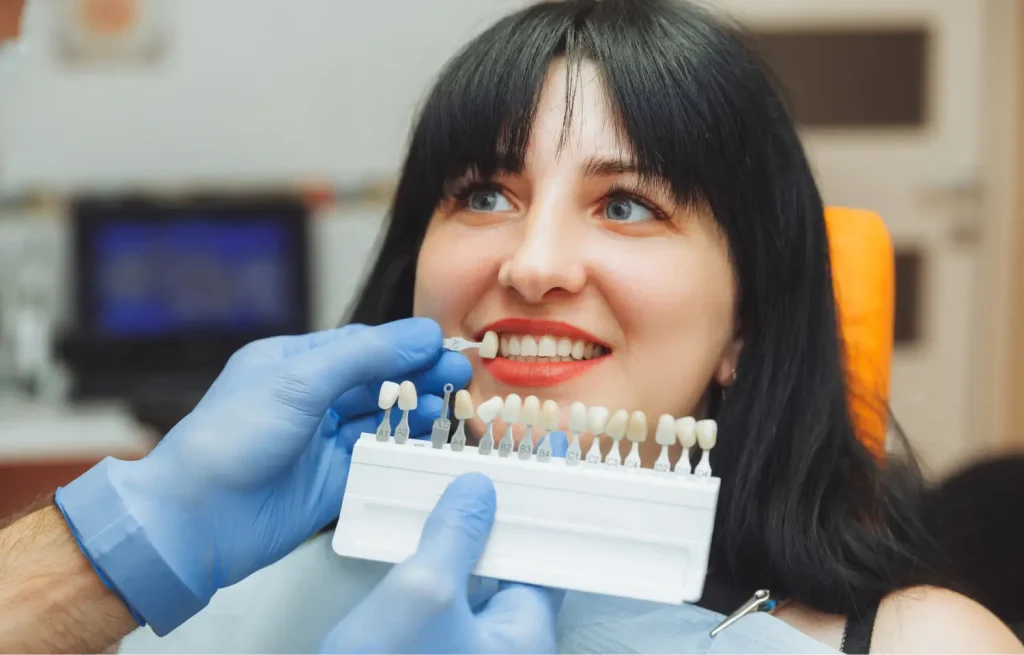Is Getting Veneers a Good Idea? The Pros and Cons of Dental Veneers
1 Sep 2024
Has something happened to your smile? Our teeth endure a lot daily, sometimes more than they can handle. When teeth wear down or become stained, it can destroy our confidence and make our lives (and the lives of our loved ones) a little bit less bright.
Dental veneers can complete your smile and bring back brilliance. They are made from thin, strong materials such as porcelain or composite resin. Dentists will custom-make them to lie over the surface of your teeth.
The advantages of veneers are that they help with chipped teeth, discoloration, and gaps, which is why they are so popular. But there are disadvantages to veneers, too. If you’ve considered brightening your smile, we can help you understand the benefits and drawbacks of veneers.
Should I get Dental Veneers?
Veneers are very popular, especially with people who suffer from cosmetic dental issues like stains, chips, and cracks.
Veneers are a thin layer of porcelain or composite resin that sits over your existing tooth.
They reflect light in the same way as a tooth, matching the natural color of your tooth enamel. They cover imperfections and give you back an even, confident, and beautiful smile.

How Veneers Work
Veneers work by gluing (or bonding) a thin layer of material to the front of your existing teeth. They quickly and reliably cover things like stains or damage.
Veneers are popular because they can easily and quickly change the size, color, shape, or length of teeth.
How do you get veneers? It’s simple and takes only 4 steps:
- Dental Consultation: Talking to your dentist will help you understand what’s possible with veneers and other options like veneers vs crowns or implants.
- Tooth Preparation: Your teeth need to be prepared, which involves taking a small layer off the tooth’s surface, similar to the thickness of the veneer.
- Veneer Customization: Every veneer is custom-made to the exact shape and color of your natural teeth. This ensures a natural smile.
- Bonding: Using a special cement, the dentist glues the veneer to your teeth, ensuring it’s perfectly aligned so that it matches the rest of your teeth exactly.
Can you get veneers without shaving your teeth? No-prep or snap-on teeth veneers are an option for some patients. While they are less strong, more bulky, and less customizable, they are less invasive, which might make them better in some instances.
Are Veneers Worth It?
Within 2 days, you can transform your smile, removing all the little things that make you think twice before smiling for a photo or meeting someone new.
Veneers help your smile by:
- Removing coffee stains on teeth (as well as wine or tobacco stains)
- Repairing chipped teeth
- Repairing cracked teeth
- Closing space between teeth
- Elongating worn-down teeth
What Veneers Last the Longest?
Porcelain veneers last the longest, often for 10 – 15+ years with the proper care. Next are Composite Veneers that tend to last 5 – 7+ years. No-prep or snap-on teeth veneers can also last 5 – 7+ years.
So long as you maintain good oral hygiene by brushing and flossing, have regular checkups, and avoid biting your nails or opening bottles or cans with your teeth, you can enjoy a beautiful, natural smile without the hassle of unnecessary visits to the dentist.
Who Needs Veneers and Who Doesn’t?
Veneers are perfect for fixing cosmetic issues like stains, chips, cracks, and gaps. However, they are not suitable for everyone.
Your dentist will be able to give you more information during your consultation but to help save you some time, here are some questions to help you know if you’re perfect for veneers:
- Dental Veneers: Do you want to whiten stained teeth, repair cracks and chips, or close gaps in your teeth? Then veneers are likely a great choice.
- Good Oral Health: Do you look after your teeth? Do you have healthy gums with no decay or gum disease? Do you have enough enamel so that the veneers will stick? If yes, you are a perfect candidate.
- Healthy Oral Lifestyle: Do you use your teeth to open things? Do you bite your nails? Do you grind your teeth? If so, veneers might not be suitable.
- Realistic Expectations: Are you comfortable with veneers and how they work? Knowing their advantages and limitations will help you make the right choice.
- Financial Considerations: Does insurance cover veneers? Veneers are often considered cosmetic procedures, so insurance typically doesn’t cover them. Be prepared for out-of-pocket expenses.
For some people, other options will be better. What is the best choice when considering veneers vs. implants? Or veneers vs. crowns? Come for a consultation, and we can help you understand the difference.
We may recommend better treatments depending on your dental health and teeth alignment. For example, braces or Invisalign are much better at straightening teeth, helping maintain an effective bite and healthy jaw. Professional whitening can give you a perfect smile without altering its structure.
Meanwhile, we need to repair more serious damage before considering veneers. Veneers are unsuitable for people with lots of cavities, gum disease, or weak and missing teeth.
The good news is, if you have good oral health and like the look of veneers before and after treatment, they are a simple and easy way to give you back a natural and beautiful smile.

The Pros of Veneers
Most of our clients want to regain a natural smile because of issues with stains, chips, or cracks. But dental veneers have functional benefits, too. They are custom-made to fit your mouth, making your smile look better and also help protect your teeth and improve your bite.
Veneers and your smile:
Both porcelain veneers and composite veneers improve your smile by fixing:
- Gaps between teeth
- Poorly aligned teeth
- Teeth that appear too small
- Misshapen teeth
- Cracked or chipped teeth
- Deeply stained teeth resistant to regular whitening treatments
Because each veneer is custom-made to fit the color and shape of your natural teeth, you are left with a naturally brilliant smile.
Smiling more helps you appear healthier and more confident so, why not show your smile off without worrying about people staring?
By fixing how your teeth look today, you can feel yourself when meeting old friends or making first impressions at work or out and about!
Veneers and Your Bite
Looking good is one thing, but veneers also help improve your oral health. This means you can feel even more confident knowing your teeth are protected.
How do veneers help improve your oral health?
- Veneers protect against decay. They seal cracks and chips, stopping bacteria from entering and damaging the tooth even more.
- Veneers fill tooth gaps. The biggest cause of decay is plaque and bacteria getting into gaps in teeth. Closing these gaps removes the risk.
- Veneers strengthen your teeth: The protective layer from a veneer strengthens teeth from future damage from overly acidic or alkali foods, making them less sensitive.
Veneers improve your bite: By evening out your teeth, veneers reduce future erosion that could expose the sensitive parts of your teeth, preventing structural damage and toothache.
How Long Do Veneers Take to Put In?
You can have your veneers finished in just two visits to the dentist.
- The first visit involves taking a model of your teeth and preparing the top layer of enamel for the special cement.
- On the second visit, your dentist will glue your custom-made veneer to your teeth, ensuring they align perfectly in your mouth.
It’s one of the quickest treatments, especially compared to braces. It’s also one of the most effective because veneers can treat multiple problems at the same time.
They can last up to 15 years (although we’ve seen them last for 20 with the right care!), which means you could have a stunning smile for decades off the back of only two veneer appointments.

The Cons of Veneers
Unfortunately, insurance will not cover most veneers. They are considered cosmetic treatments. Considering the cost of veneers is essential before you begin your journey.
We are often asked, “Are veneers reversible?” They are not, so make sure it’s the right choice before you commit. There are also things you need to do to ensure your veneers stay in great condition and last for a long time.
The Cost of Veneers
The cost of dental veneers can be a significant factor for many patients. Prices vary widely depending on several factors:
- Where to get dental veneers: if you live in a city, you will often pay more for veneers due to higher rents and utilities.
- Type of veneers: Porcelain veneers last longer but are typically more expensive. Composite options are more cost-effective but need to be replaced more often.
- Number of veneers needed: The number of veneers needed will determine their price. Veneers are charged on a per-tooth basis.
To give you a rough estimate of how much veneers cost:
- Porcelain Veneers: Between $900 – $2,500 per tooth
- Composite Veneers: Between $250 and $1,500 per tooth.
Other types of veneers will fall into a similar range, so check with your dentist to see if you’re considering zirconium or luminaireers.
Every veneer is custom-made, which influences the cost. You should also consider your consultation, which typically costs around $500.
Veneers Are Permanent
Veneers are glued or bonded to your natural teeth. This means that the process cannot be undone.
The preparation on day one will remove a layer of enamel. This changes the structure of your teeth, and it will not grow back.
Veneers are a long-term commitment, but with proper care and attention, you can reduce the time needed to maintain them. The good news is that most veneers last 5 – 15 years before they need to be replaced.
Ongoing Care Requirements
Veneers are durable but that doesn’t make them invincible. There are some straightforward steps you can take to look after them and maintain a perfect smile for longer:
- Good Oral hygiene: Brushing and flossing regularly will maintain the whiteness and shape of your veneers by preventing decay of your natural teeth and gum disease.
- Avoid Bad Habits: Chewing on pens or ice, biting nails, or using your teeth to open packaging or bottles will reduce their lifespan. Try to cut down on these habits at all costs.
- Wear a Mouthguard: Many people grind their teeth at night (bruxism), which can damage their veneers. If you grind your teeth, it’s best to wear a mouthguard.
- Use Mouthwash Or Brush Your Teeth After Coffee. Your veneers are stain-resistant, but coffee or wine can still dull their whiteness. Brush or wash your teeth regularly after drinking coffee or wine.
- Book Regular Dental Check-Ups: Preventing a problem with your veneers is always easier than treating one. Catching issues early with regular check-ups will save you time and money!
Veneers are strong and durable, and with the right care, they can last decades. The best way to get the most out of them is to pay attention to brushing your teeth and avoid bad habits.
Before you decide, ensure you are comfortable with the veneers’ financial impact and permanence.
This can be an essential decision. You can speak to us at any time to learn more about the process and after-care.
Making Your Decision
Which veneers are best? What veneers last the longest? Can veneers be whitened? Our customers ask us these questions daily, and we’re happy to answer them for you too.
Veneers have changed the lives of countless people by boosting their confidence with a whiter, more natural, straighter smile. However, they have cost implications and require good care to ensure they last.
Where can you find veneers in Houston, Texas? Here at Greenspoint Dental, we offer personalized advice in a welcoming and friendly atmosphere.
Learn more about the pros and cons of veneers with us. We can walk you through the process and the pricing so that you have all the information you need to make your decision. We can also support you with aftercare, including education and reminders.
Making decisions like this can be complex, and you might need a helping hand, which is why we focus on patient-centric, comfort-focused care. We accept many different dental insurance plans, such as CareCredit, Lending Club, and the HELPcard.
Please call (281) 823-9987 today or contact us for a consultation.
FAQs
What are the advantages and disadvantages of getting dental veneers?
The benefit of dental veneers is that they give you a naturally-looking smile that is easy to maintain. The procedure is simple, quick, and minimally invasive!
The cons of dental veneers is that they are not invincible, meaning they can get damaged or stained if they’re not looked after properly. In time, you’ll need to revisit your dentist to keep your veneers in top condition!
Can dental veneers enhance the appearance of your smile?
Yes! The best feedback we can get is when our customers tell us how much better they feel with straight teeth and a natural smile. Veneers are a great way to do this.
What are the main drawbacks of using veneers?
Just like natural teeth, veneers can chip or crack over time. They can also be costly to replace and repair. Our best advice is to always look after your teeth, whether they are natural, implant, or veneers!
Is it possible to achieve a perfect smile with veneers?
Yes, veneers can help you get that Hollywood smile. After years of neglect, giving up on your smile can be easy, but we promise we can help. Whether you’re unhappy with your teeth’ size, shape, or color, talk to us about how we can help.
Related Blog Articles